
Viking Names
Crosby
Crosby, in the Manley Wapentake of Lincolnshire, is a difficult name. The earliest spelling of the name in the Domesday Book suggests that the name comes from the Old Norse male personal name Kroppr and the Old Norse element bý ‘a farmstead, a village’. However, it is believed that this spelling is an error as it is not supported by later forms which indicate rather a place-name meaning ‘the farmstead, village marked by crosses’, from krossa, the genitive plural of Old Norse kross ‘cross’, with Old Norse bý.
Read More
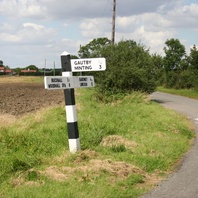
Viking Names
Gautby
Gautby, in the South Riding of Lindsey in Lincolnshire, comes from the Old Norse male personal name Gauti and Old Norse bý ‘a farmstead, a village’.
Read More
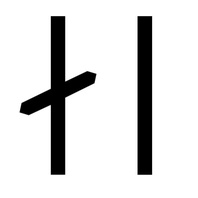
Viking Names
Eileif
The Old Norse male personal name Eiláfr/Eileifr is not always to be distinguished from another Old Norse male personal name Eilífr. This is evident in the place-name Elston, Nottinghamshire where the first element is either Eiláfr or perhaps Eilífr. Eiláfr/Eileifr is an Old Norse compound name with the first element being either Ei- ‘always’ or Ein- ‘one, alone, single’ combined with the second element -leifr/-láfr ‘inheritance’ which when used in a personal name likely has the sense of ‘son’. This name was frequently used throughout medieval Scandinavia and is attested in Danish place-names and runic inscription, Swedish runic inscriptions, and became common in Norway after 1270. The name occurs in Domesday Book, and later medieval documents, for both Lincolnshire and Yorkshire.
Read More
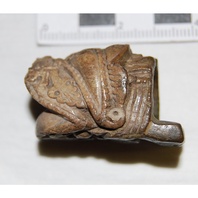
Viking Objects
Dragon’s Head Mount (L.A67.1864.1.0)
This mount from Leicester is in the form of a dragon’s head and is thought to be Scandinavian work. The base of the head is extended, slotted and necked as though for a hinge. There are green stains suggesting that it was attached to an item of copper or bronze. Mounts were generally used to decorate various items such as belts or pouches. In this case, it may have been a fitting for a knife. Mounts were usually attached to items by hammering over the metal studs on the back of the mount.
Read More
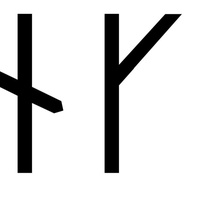
Viking Names
Inga
Inga is very common in Denmark and Sweden (where it appears in a number of runic inscriptions) and probably spread from these two areas into Norway in the thirteenth century. where the name remained popular thereafter; however, it is also possible that Inga developed independently in Norway. In the Danelaw, Inga appears in medieval documents from Lincolnshire as early as c. 1160. The name is a short form of Old Norse female names in Ing(i)-, which is of doubtful origin but perhaps related to a Greek word meaning ‘lance, staff’.
Read More
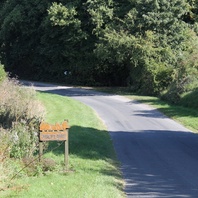
Viking Names
Ruckland
Ruckland, in the Louth Eske Wapentake of Lincolnshire, is a Scandinavian compound formed from Old Norse hrókr ‘a rook’ and Old Norse lundr ‘a small wood’.
Read More

Viking Names
Saxulf
Saxulfr is an Old Norse compound of Sax-, from either Old Norse sax ‘short sword’ or Saxar the masculine plural of ‘Saxons’, and –ulfr ‘wolf’. The mutated form Sǫxulfr appears early in West Scandinavia, but it is not very common. It is found in one Norwegian place-name, a couple of place-names in Sweden, and a number of place-names in Denmark. Saxulfr is also likely the first element of the place-name Saxilby, Lincolnshire.
Read More
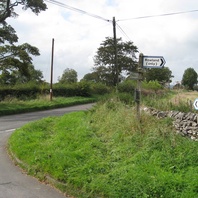
Viking Names
Rowland
Rowland, in the High Peak Hundred of Derbyshire, is a Scandinavian compound from Old Norse rá and Old Norse lundr ‘a small wood’. It is difficult to determine if the first element rá either means ‘a roe, a roe-buck’ or ‘a land-mark, a boundary’. The forms also show the common replacement of lundr with land which also happened in Hasland, Derbyshire.
Read More
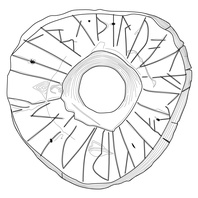
Viking Designs
Drawing of the Saltfleetby Spindle Whorl
Drawing of a lead alloy spindle whorl from Saltfleetby, Lincolnshire showing part of the runic inscription. For further information, see the entry for the original item.
Read More

Viking Names
Aylesby
Aylesby, in the Bradley Wapentake of Lincolnshire, comes from the Old Norse male personal name Áli and bý ‘a farmstead, a village’. Áli is also the first element of Ailby, Lincolnshire, and Alby, Norfolk.
Read More
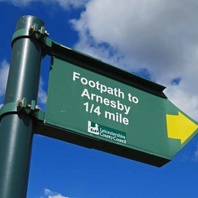
Viking Names
Arnesby
The first element of Arnesby, in the Guthlaxton Hundred of Leicestershire, is likely the Old Danish male personal name Iarund (Old Norse Iǫrundr) which might have given a Middle English form Erendes in the genitive. However, it has been argued that the specific element might be the Scandinavian appellative erendi ‘errand, message’ which may be an unrecorded byname. The second element is Old Norse by ‘a farmstead, a village’.
